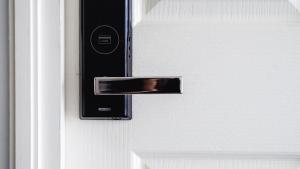Digital Locks for Elderly, Disabled and Vulnerable Residents
Keyless entry systems that rely on keypads, biometric fingerprints, or facial recognition features are excellent home security solutions for seniors suffering from various cognitive or physical impairments, including Alzheimer's and dementia. These locks are managed with the help of access codes and cards, key fobs, Bluetooth, wireless, and smart technologies instead of traditional keys. This means they eliminate the hassle of carrying keys on key rings while trying not to lose or misplace them, which can be difficult for vulnerable individuals.
Keyless door locks, therefore, provide extra convenience, enhanced peace of mind, and increased security while simplifying one's life. If you need emergency keyless lock installation or repair services, give us a call right now. In case you want to learn more about the way these locks and security systems work, keep reading.
Electronic Access Control Systems Are Easy to Use
 When compared to standard, metal keys, an electronic access control system is a lot simpler to manage, while providing enhanced security. These systems will help you know for a fact that vulnerable members of your family will be able to easily lock and unlock their doors. At the same time, unauthorized persons (potential burglars included) will not be able to open the locks. A misplaced or lost mechanical key will no longer be a huge hassle to tackle, nor will it represent a serious security threat. Key cards can easily be canceled when changing nurses or caregivers, as needed. Cutting and handing over new keys, changing locks, or installing new ones will no longer be a problem to concern yourself with when using access control systems.
When compared to standard, metal keys, an electronic access control system is a lot simpler to manage, while providing enhanced security. These systems will help you know for a fact that vulnerable members of your family will be able to easily lock and unlock their doors. At the same time, unauthorized persons (potential burglars included) will not be able to open the locks. A misplaced or lost mechanical key will no longer be a huge hassle to tackle, nor will it represent a serious security threat. Key cards can easily be canceled when changing nurses or caregivers, as needed. Cutting and handing over new keys, changing locks, or installing new ones will no longer be a problem to concern yourself with when using access control systems.
With the help of intuitive software and wireless locking devices, you will get to monitor everything in real-time, instantly issue new access credentials to new caregivers, and save precious time, energy, and money. Seniors or disabled individuals with limited mobility will have a much easier time letting visitors and caregivers in. Instead of having to go to the door and unlock it, caregivers can be given immediate access to the premises with the help of access codes or cards. This will allow them to let themselves in and provide the needed assistance to your loved ones.
Keyless entry systems can also be programmed in such a way as to only enable access to people at chosen times. Seniors and disabled individuals will get a greater sense of security at the thought that visitors can only visit at times and dates they had agreed upon.
Fingerprint Smart Locks
These locks rely on Bluetooth and sensitive touchscreens. They usually enable users to opt for different door opening alternatives, including access codes, fingerprints, and even physical keys. The latter option is helpful for caregivers interested in a sure way of getting inside the house in case of emergency.
The keypad on these lock models is represented by a touchscreen, a highly convenient solution for the elderly with limited mobility. Programming the access code is done in just a few minutes. Afterward, there is no need to concern yourself with having to push extra buttons or deal with stuck button issues. The touchscreen also enables users to opt for the fingerprint IDs option by simply holding a finger in place and letting the technology recognize it on the spot.
Some models come with extra features, including long battery life, anti-peep keypad options, or entry logs. For seniors who tend to wander off unexpectedly because of their health problems, these features are extremely valuable.
Burglar-Proof Digital Door Locks
These locks work well with standard locks that feature deadbolts. They do not have any keyholes, which makes them good pick-proof solutions against potential burglars who might try to use bump keys. Most of these models feature auto and even double-locking modes for added protection. They can also disable themselves when someone attempts to force their way in or when multiple attempts to enter the access code are recorded.
The best locks also come with a dedicated “away mode” which can be enabled when being away for a longer time. In this mode, the lockset will sound an alarm whenever the lock is tampered with from the interior of the house. Digital locks that have a handle that can be pushed and pulled instead of turned. This will prove to be particularly convenient when used by disabled family members or seniors suffering from arthritis and other types of health issues that limit mobility.
Some locks even come with fire warning features that will automatically sound an alarm when smoke or heat is identified. Besides the mandatory smoke and fire alarm inside the house, the extra alarm on the lock adds an extra layer of protection for the elderly who are hard of hearing.
Confounding Locks for Seniors With Impaired Cognition
If you are a caregiver for a senior suffering from dementia, Alzheimer's, or a different problem that is impairing their cognition, a confounding lock will help you further protect your loved ones and prevent them from potentially causing any harm to themselves. These locks do not have the standard lock aesthetics and they require a specific pull-and-rotate movement on the blocker that will be jamming the door. This will make the elderly who tend to wander off enjoy more protection, as they will have a hard time identifying and using the lock. For similar reasons, these locks should only be installed on interior doors that swing inwards, at unusually high or low positions on the door frame.
For more details on the best security locks for the elderly, get in touch with us or take a look at the rest of the home protection solutions we can provide for you.
